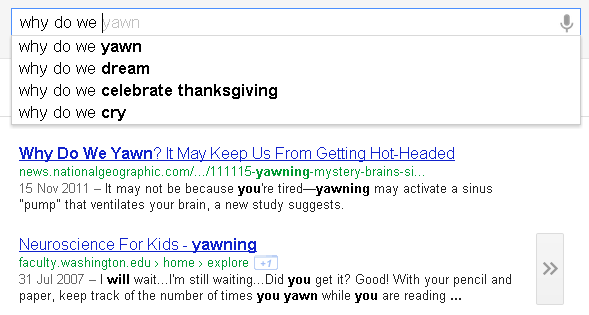This is a quick checklist of factors which Google could use to drive their “Google Suggest” auto-complete feature. When users type in a search query Google tries to complete that query by selecting suggestions from many different datasets. Do they really understand the topic or make judgement on the search query? The answer is no.
How they make their suggestion choice may depend on several factors:
- Search Volume
- Geographic Location
- Google Domain (TLD)
- Personalisation (Logged in users)
- Perceived Search Intent
- Query Deserves Freshness (QDF)
- Context (Citations, mentions and references)
- Language
- Search Verticals
- Social Media
Search volume is a heavy influence. Basically if a lot of people from different computers search for the same phrase Google will make a note of that and will start serving it as a suggestion for all future searches which match that phrase pattern.

This can develop further by refining and customising suggested phrases through several other parameters. One of them is geographic location of the user. Users from Australia will see different suggestions for locally relevant search queries. Same counts for searching from different TLDs of Google (e.g. .com, .com.au, .co.uk).
If users are logged in customisation of results can go even deeper by observing users browsing history, bookmarks and interests from various data sources available to Google.
All of the above factors can be modified by search query intent. Google understands that potential searches may differ for search on ‘fruit bowl ebay’ and ‘fruit salad recipe’.
Sometimes we just want to find results for the score of the game or outcome of a recent event. Google will recognise this and serve more recent suggestions, effect described as “Query Deserves Freshness” or QDF.
Naturally like anything else in search all terms are assessed in their context, if a phrase should appear a lot of times on forums, blogs, news articles and websites it may in fact creep into Google’s suggest feature.
Language plays another role and your suggestions may differ if your first word is in a certain language or your language preference is set in your Google account.
Users can now search through Blogs, News, Scholar, Local and many other types of search verticals – auto suggest may differ in each as search intent and style may depend on the vertical users utilise.
Social signals could be used much like citations and references but in combination with more timely response (QDF) and all main search engines (including Google and Bing) observe social signals when determining rankings and this data is certainly available to them when creating search suggestions.
Additional Notes:
AJ Kohn points us in the direction of another feature called Google Scribe:
“Google Scribe technology takes over (usually on very long queries) and it’s simply determining what the most frequently used next word might be.”
He writes more about Google Scribe feature on his blog.

Note: My intent was to have PageRank as that would complete one of my articles but the word obviously didn’t seem relevant enough in the above context.
Dan Petrovic, the managing director of DEJAN, is Australia’s best-known name in the field of search engine optimisation. Dan is a web author, innovator and a highly regarded search industry event speaker.
ORCID iD: https://orcid.org/0000-0002-6886-3211

Hi Dan,
I like the breakdown. I think it backs up the fact that companies should continue to produce content (even though many big corps are dropping their blogs.) Is your numerical list in order of importance/weight, or is it just a regular list of certain factors? I’d be interested to know.
Thanks.
A mix of strength and (towards the bottom of the list) certainty.